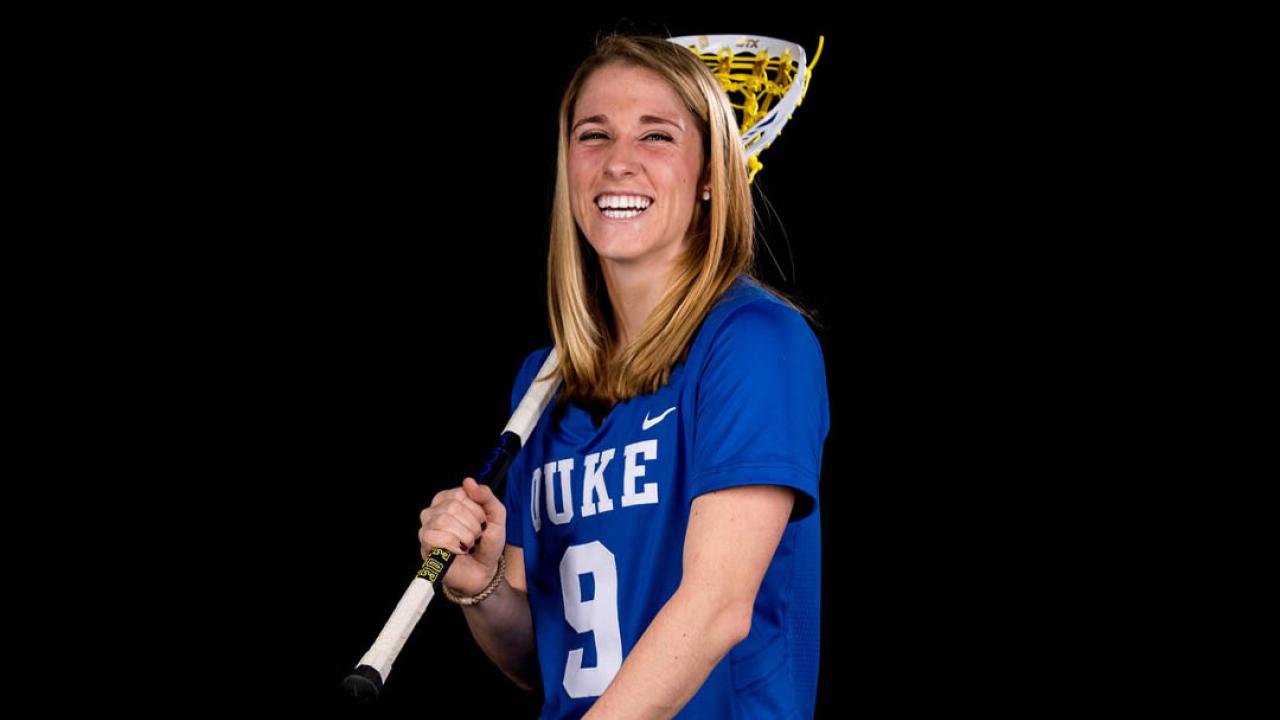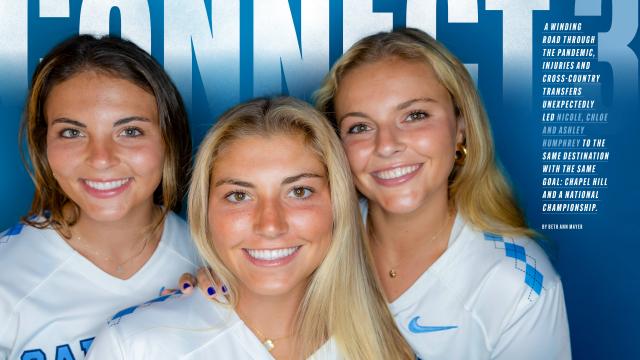
Morgan’s Messenger: You Need to Be Here
This story was originally published in May 2022 and is being re-shared to recognize five years since the passing of Morgan Rodgers.
MORGAN RODGERS LOVED MUSIC. She always knew about the best new tracks and was essentially the locker room DJ as a player on the women’s lacrosse team at Duke University.
“She was light-hearted, very into music and dancing, and, overall, a ray of sunshine,” said Kat Zempolich, who grew up 20 minutes from Rodgers but didn’t meet her until they played together at Duke.
But inside, Rodgers was often singing a different, darker tune. She had gone to therapy for anxiety in high school. When she arrived in Durham, Zempolich said she seemed bubbly but a little frustrated by her lack of playing time during fall ball and the spring of her freshman year. She was used to being a star. A three-time conference player of the year at Kettle Run in Virginia, Rodgers was selected to the Under Armour All-America Underclass teams.
But Rodgers took her role on the scout team in stride as a rookie. She had to learn and pay her dues. With a year under her belt, she had her eye on a larger role as a sophomore. Then, things came crashing down — literally — in practice.
“She was dodging … and stepped the wrong way,” Zempolich recalled. “We heard a pop. She went down and screamed. I can still see it in my head … She completely demolished her knee. We joke that Morgan was good at everything she did. Even her injury, she did it better than anyone else.”
Rodgers had level-three tears in her ACL and MCL. Casual sports fans may constantly see players tear ACLs and return a season later. They may make it look easy. But it’s not — physically or mentally. And Zempolich says it’s “earth-shattering” for a Division I athlete whose identity is so closely linked to being good at sports and have never gone through a career-altering injury before.
“She was on a scooter for eight weeks,” Zempolich said. “It was almost an out-of-body experience where her body didn’t know what was going on, and I don’t think her mind could comprehend it.”
Zempolich was out with a hip injury at the same time. She had also experienced mental health issues and became a safe space for Rodgers to open up just a little. The two had monthly dinners, and Rodgers went all out.
“She would be like, ‘What do you want?’ And I’d be like, ‘My mom makes this Ramen crunchy salad. I can try to find the recipe,’” Zempolich said. “Sure enough, I’d show up, and she’d be like, ‘I think I have it. Let me know what else you need.’ She’d get me my favorite fruit and wouldn’t let me get anything. She was that kind of a person.”
Rodgers was all about taking care of others. But Zempolich says she continued to struggle to care for herself. Though she could get her to talk a bit, Rodgers often shut down if another person was disappointing her. She didn’t want to speak poorly of anyone, so she buried the pain. And she was still experiencing physical pain. Her recovery wasn’t smooth sailing. When Duke head coach Kerstin Kimel suggested she take a leave before her junior season, she did.
It was a setback that seemed to have a silver lining. Zempolich coached with Rodgers that summer, and she seemed better than before.
“She was moving around and had this air about her,” Zempolich said. “I was like, ‘Hell yeah, Morgan is back.’”
But when Rodgers got back to campus, she regressed again. She ultimately left the team. Unable to give up the sport she loved and shined at for so long, she started playing club. It seemed like the perfect fit.
“She was finally having fun … she was crushing it,” Zempolich said.
About two months after leaving campus, Rodgers died by suicide. She was 22. When Zempolich learned the devastating news over text, she didn’t believe it.
“I was like, ‘No … she was so good. She was finally in a place where she was excited about life again,’” Zempolich said
Our main goal was that we don’t want anyone else to lose their Morgan.
Kat Zempolich
Years later, Zempolich’s voice still cracks when she discusses Rodgers’ death, but the first 365 days were some of the hardest of her life. The two had parallel narratives woven throughout their lives and collegiate careers — injured at the same time, mental health issues. Zempolich struggled with survivor’s guilt.
“It was like, ‘Why am I OK, and she is not? How could I miss these signs? Could I have done more?’” Zempolich said.
Zempolich went to therapy, sometimes multiple times per week, to work through her pain. Finally, as the one-year anniversary of Rodgers’ death crept up, she decided she wanted to visit the gravesite. It was May, and Rodgers’ birthday was coming up. The timing seemed as right as it ever would. She called Dona Rodgers, Morgan’s mother, who decided to join her. Former Duke teammate Anne Slusser did, too. After visiting the grave, Dona Rodgers invited her back to the house.
“It’s kind of a nightmare,” Zempolich said. “I wondered if she’d ask what happened and what went wrong.”
But she’s ultimately glad she went.
“We were sitting around, and we were like, ‘Something needs to be done.’ I was so sad that Morgan passed. Ann and I had gone through our own mental health struggles.”
Shortly after, Morgan’s Message was born at a barbeque with some of Rodgers’ former Cardinal Club Lacrosse teammates. The non-profit amplifies stories, expertise and resources to help student-athletes cope with mental health.
What started as a podcast called “The Mental Matchup” in 2020 has grown into a movement. One story originally told on the podcast by Vanderbilt attacker Cailin Bracken turned into a viral written piece that was re-published with permission on the USA Lacrosse Magazine website and made it all the way to the popular morning program “Good Morning America.”
There are now 950 ambassadors. The Duke football team and Virginia men’s lacrosse team have sported Morgan’s Message decals on their helmets. High school and college teams around the country have hosted games in honor of Morgan’s Message to raise awareness for mental health.
But despite the publicity and exponential growth, Zempolich is still focused on the core mission of the group: Just reaching the one person who needs help.
“Our main goal was that we don’t want anyone else to lose their Morgan,” Zempolich said. “Selfishly, I don’t want anyone to feel how I felt when I was at my lowest of lows or how Morgan felt. If I could do anything to help one person, it will be worth it. If I can honor Morgan, it’s a cherry on top.”
The growth is due, in large part, because of the demand for resources. This semester alone, multiple student-athletes have died by suicide, including Binghamton University goalie Robert Martin. In the span of one week in late April, two female student-athletes died by suicide in Wisconsin track’s Sarah Shulze and James Madison softball’s Lauren Bernett. It’s a sign that Morgan’s Message has so much left to do despite all the organization has done.
“Whenever we hear of someone dying by suicide, it’s like a dagger,” Zempolich said. “We’re doing so much, yet it feels like so little sometimes because people are still passing … and I’m sure there are more people we don’t hear about because they don’t get publicity.”
Research suggests student-athletes are more likely to experience mental health issues like anxiety and depression than the general population. But Zempolich thinks it’s less about athletics and more about people’s expectations of themselves. For Division I athletes or people attending an elite university, the drive to succeed is strong, and failure can feel devastating.
“At Duke, being in an environment where everyone is high-achieving, it’s going to be hard to say, ‘Hey, I’m struggling,’” Zempolich said. “You’re expected to be at the top of your game in the classroom and extra-curriculars and, as athletes, be on top of your varsity sport. You’re almost in a pressure cooker where you are going to blow if you don’t get the support for what you are feeling.”
Zempolich feels every athletic department should have a sports psychologist, and student-athletes should have to meet with them at least once every two months — more if a coach, psychologist or student-athlete flags any issues. She also thinks coaches and support staff need more training on mental health.
“The education piece is so key,” Zempolich said. “How do you foster an environment where your student-athletes feel comfortable coming to you saying, ‘I’m off. What should I do?’”
Zempolich says different student-athletes will respond better to different approaches. But ultimately, it should be clear — not just through words, but actions — that the student-athlete will not be punished for coming forward about mental health issues. In fact, the more people talk about mental health, the better.
“Mental health crisis and depression live in the shadows, and we give them power when we don’t talk about them,” Zempolich said. “When we have groups of people say, ‘I had really anxiety in high school,’ or, ‘I deal with depression’ … when we normalize the conversations and see others are struggling, that’s when the power gets taken away.”
Zempolich plans to continue to scream her story and Morgan Rodgers’ from the rooftops — even if only one person hears it.
“If you are struggling, it will get better, but it’s only going to get better if you identify something you might need to work on,” she said. “You as a human being are so valued and so loved and you are worth all the diamonds and gold in the whole entire world just being you. You need you here, point-blank.”
And you deserve help.
SUICIDE PREVENTION
If you’re in crisis, there are options available to help you cope. You can call the National Suicide Prevention Lifeline at any time to speak to someone and get support. For confidential support available 24/7 for everyone in the United States, call 1-800-273-8255. More resources are available here.
Beth Ann Mayer
Beth Ann Mayer is a Long Island-based writer. She joined USA Lacrosse in 2022 after freelancing for Inside Lacrosse for five years. She first began covering the game as a student at Syracuse. When she's not writing, you can find her wrangling her husband, two children and surplus of pets.

Related Articles





